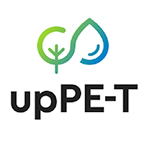upPE-T has collaborated with two other H2020 Research and Innovation projects - UPLIFT and PRESERVE -– focusing on transforming food and drink packaging into new materials or products of better quality or for better environmental value, ensuring that micro-plastics are avoided.
Plastics used in food and drink packaging applications are made from a range of polymers and are highly combined with specific additives to meet each manufacturer’s functional and design requirements. This diversity can complicate the recycling process, make it more costly, and affect the quality and value of recycled plastic. Given this, there is a need to develop technological improvements in the sense of better manufacturing and processing practices for these plastic materials to facilitate proper waste management. Developing upcycling technologies will allow sustainable recycling or biological degradation in accordance with existing and novel technologies, standards, and certification schemes.
The essence of the H2020 sister projects’ collaboration is the organization of joint events, webinars and workshops in order to disseminate and showcase the initiatives and solutions for a sustainable management of plastic packaging waste, as well as to develop and initiate networking and clustering activities to this end. The sister projects also contribute to the European Citizens Awareness Platform (ECAP) developed by upPE-T, which aims at raising awareness of the importance of Circular Economy, sorting and recycling practices together with responsible consumption"
PRESERVE aims at boosting the circular use of bio-based packaging by shifting from the current situation (fossil-based, limited recycling) to award-winning upcycling strategies from past and ongoing projects.
These new technologies include enhancing the performance of primary food packaging via bio-based barrier coatings for bioplastic and paper/board substrates and via eBeam irradiation and microfibrillar reinforcement. From the biotechnological side, PRESERVE will leverage the compounding of enzymes in bioplastics to stimulate biodegradation, the enzymatic recovery of functional oligomers and the delamination of multilayer packaging via enzymatic detergents to enable their layer separation and recycling.
Ten packaging applications will demonstrate PRESERVE’s up-scaling capabilities. The enhanced bio-packaging will be validated with different types of food and drinks, and recovered biopolymers will be upcycled in added value applications such as packaging for personal care products and reusable carrier packaging (using textiles and composites).
Recycling facilities are currently struggling when dealing with challenging plastic multi-layers, blends, and additives. Consequently, packaging plastics are mostly landfilled, incinerated, or spilled into the environment.
The overall idea of UPLIFT (sUstainable PLastIcs for the Food and drink packaging industry) is to biologically depolymerize bio- and fossil-based plastic packaging waste and convert it into more renewable and easily upcyclable polymers, following a biorefinery approach.
UPLIFT will address the full plastic packaging value chain, from monomer production to packaging material manufacturing and back to end of life reusing and recycling options.





